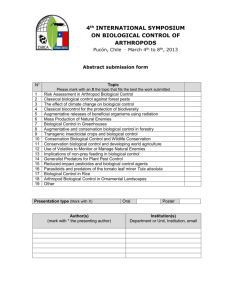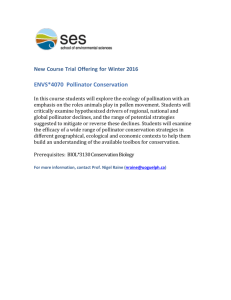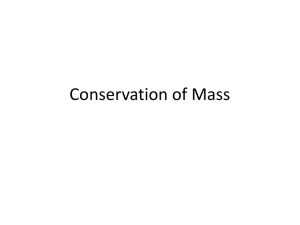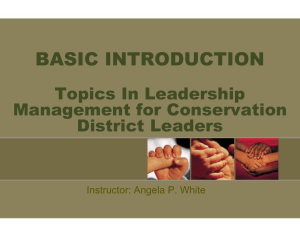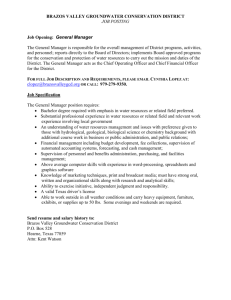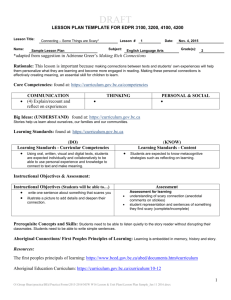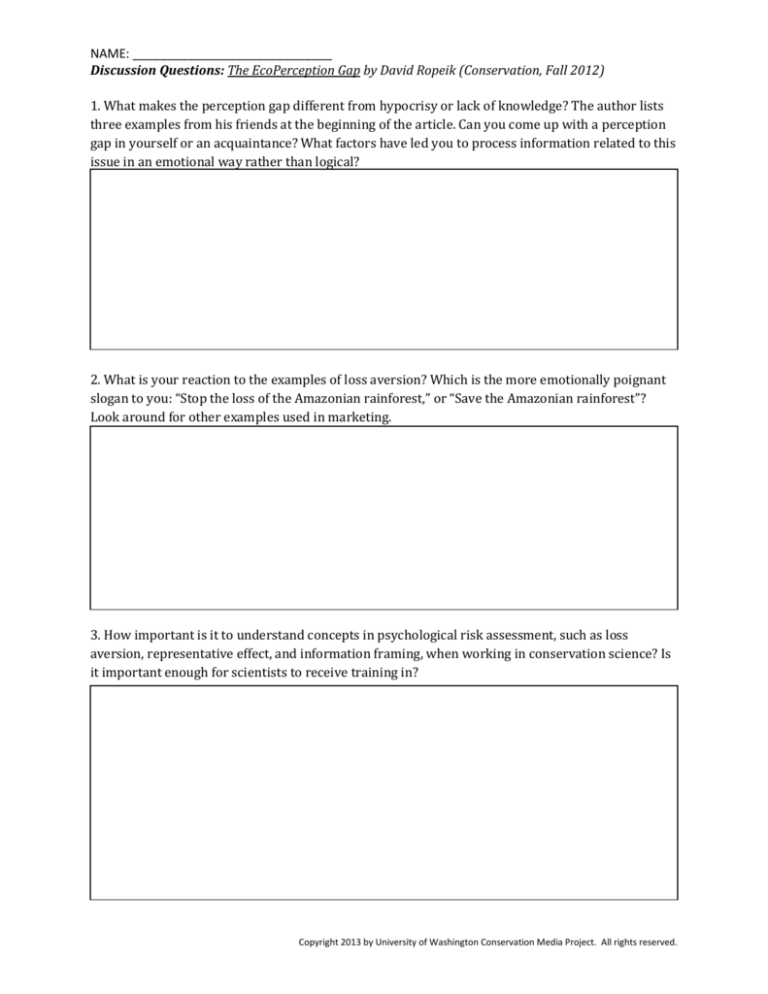
NAME: _____________________________
Discussion Questions: The EcoPerception Gap by David Ropeik (Conservation, Fall 2012)
1. What makes the perception gap different from hypocrisy or lack of knowledge? The author lists
three examples from his friends at the beginning of the article. Can you come up with a perception
gap in yourself or an acquaintance? What factors have led you to process information related to this
issue in an emotional way rather than logical?
2. What is your reaction to the examples of loss aversion? Which is the more emotionally poignant
slogan to you: “Stop the loss of the Amazonian rainforest,” or “Save the Amazonian rainforest”?
Look around for other examples used in marketing.
3. How important is it to understand concepts in psychological risk assessment, such as loss
aversion, representative effect, and information framing, when working in conservation science? Is
it important enough for scientists to receive training in?
4. The author lists his friends’ fears (mercury, nuclear power, and chemicals) as being particularly
“scary,” while climate change, particulate air pollution, and ocean acidification are perceived as less
scary. Do you agree? Is your reaction logical or based in emotion? List 10 more environmental
issues, and then rank them in terms of scariness. Pass your un-ranked list to someone else for them
to rank. Does your ranking agree with other group members’? Discuss your ranking and possible
reasons for differences between individuals.
Copyright 2013 by University of Washington Conservation Media Project. All rights reserved.
NAME: _____________________________
Discussion Questions: The EcoPerception Gap by David Ropeik (Conservation, Fall 2012)
4. The author lists his friends’ fears (mercury, nuclear power, and chemicals) as being particularly
“scary,” while climate change, particulate air pollution, and ocean acidification are perceived as less
scary. Do you agree? Is your reaction logical or based in emotion? List 10 more environmental
issues, and then rank them in terms of scariness. Pass your un-ranked list to someone else for them
to rank. Does your ranking agree with other group members’? Discuss your ranking and possible
reasons for differences between individuals.
5. Choose an environmental issue that you think does not receive enough attention or response
from public attitude or policy. Evaluate how this issue falls into the categories of risk-perception
factors given in the article. Pick one or two perception factors that you think could be influenced,
and describe how a campaign/discussion/information could be used to influence that risk
perception factor.
Copyright 2013 by University of Washington Conservation Media Project. All rights reserved.
NAME: _____________________________
Discussion Questions: The EcoPerception Gap by David Ropeik (Conservation, Fall 2012)
6. What is your reaction to the four categories of people’s cultural cognition (hierarchists,
egalitarians, individualists, and communitarians)? What do you think influences the categories you
fall into (e.g. your personality at birth, your ‘tribe’ or environment you’re raised in, your age, your
economic status)? Do you think people are ‘stuck’ in the same categories throughout life? Do you
know anyone in your life that you think has switched from one type to another? How could an
understanding of these concepts influence how conservation science is communicated?
7. The author says that one reason people have less fear of certain global environmental issues,
such as climate change, is that they believe it will only affect ‘someone else.’ Do you think this is
true? What other conservation issue face the same hurdle in gaining public appreciation? What
activities can a conservation scientist do to connect people to environmental issues? Do you know
of an example that has done this effectively? (HINT: could be a local issue)
Copyright 2013 by University of Washington Conservation Media Project. All rights reserved.





